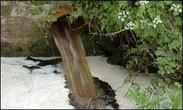Decentralised Wastewater Systems
The TRUTH about our Sewerage Systems
Why the FilterPod non-electric sewage treatment plant is the answer to low cost, sustainable sewage treatment.
Failing sewage infrastructure nationwide has been described as “a ticking time bomb that's ready to go off.” The truth is, the fuse has almost burnt out.
Why Decentralise Sewage Treatment?
One of the major benefits of a decentralised sewage system like the FilterPod is that there is no large, sprawling, vastly expensive infrastructure to repair. All across the country, aging, undersized, centralised municipal sewage works and sewage pipelines are failing at an alarming rate. Take a look at the E.A. website which states :-
'Pollutants
In 2014, sewage was the most common pollutant, found at 15 per cent of serious incidents. This is not surprising given that the sewage and water industry caused the most incidents. Also common were waste materials, namely asbestos, household rubbish and vehicle parts.'
Between 2008 and 2015, water companies in England and Wales were prosecuted 1098 times for serious pollution offences, with Thames Water, Southern Water and United Utilities being the three biggest culprits.
Since new sentencing guidelines came into force in July 2014, three of the UK’s highest pollution fines dealt out to water companies have been issued. United Utilities has hit with a £750,000 fine in March 2015, Southern Water with £500,000 in November 2014, and Severn Trent with £480,000 in September 2015. Sites polluted include a very important Nature Reserve, .
The Water Companies are fined on a regular basis (but not enough) because the infrastructure is not coping.
Now Britain faces having to pay £MILLIONS in fines to the European Union plus having to spend £BILLIONS to avoid future fines!
Take a look at these appalling records:
http://www.web4water.com/news/news_story.asp?id=17119
http://news.bbc.co.uk/1/low/england/hampshire/7594422.stm
And these are just some of them. To list them all would require an entire website.
Over ten billion litres of sewage are produced every day in England and Wales. To treat this volume of sewage requires approximately 2,800 GWh of energy in 2006/07, equating to 1.7 million tonnes of greenhouse gas emissions. The electricity demand required to treat sewage is expected to increase in the future as the population grows, we adapt to climate change and continue to deliver environmental improvements.
It is time that we all started to re-evaluate the sense - or lack of it - in centralising all sewage treatment - Just imagine if the only effluent leaving every property was clean water with a ZERO carbon footprint?
Anglian WaterPollution of the Great Ouse

One of the big problems is that towns and villages have grown massively in the last 20 years, with housing estates and smaller developments mushrooming on both brownfield and greenfield sites. This increase in sewage production, is rarely matched by a corresponding upgrade of the municipal sewage works, resulting in overloading and pollution problems. Wet weather makes it dramatically worse as raw sewage is discharged into storm drains - which discharge into rivers - as a coping mechanism. The Water Companies do not have the resources to upgrade surface and sewage drains and works every time a new planning permission is granted and the Planning Departments hardly ever enforce it as a requirement.
If every new house treated its own sewage, discharging only clean water to the surface water drains, then this problem would be eliminated.
The UK Water Companies produce over 1.7 million tonnes of CO2 emissions per year. An acre of woodland absorbs 2.6 tonnes per year. If the UK adopted non-electric, decentralised sewage treatment it would save the equivalent of 653,846 acres of woodland (nearly 50 times the size of The New Forest!) CO2 absorbtion capacity.
Bacteria in sewage
| Pathogen | Disease Associated |
| Campylobacter | Gastroenteritis |
| Chlostridium Botulinis | Botulism |
| Certain Coliforms | Diarrhoea & Blood Poisoning |
| E.Coli-0157 | Gastroenteritis & Renal Failure |
| Leptospira | Leptospirosis (Weill's Disease) |
| Proteus types | Diarrhoea |
| Psuedomonas | Localised Infection |
| Salmonella Typhi | Typhoid & other enteric fevers |
| Other Salmonella serotypes | Food Poisoning Symptoms |
| Shigella (various) | Bacterial Dysentery |
| Tubercle bacilli | Tubercolosis |
| Yersinia enterococci | Gastroenteritis |
Viral Pathogens in sewage
| Pathogen | Disease Associated |
| Adenovirus | Acute Haemorrhagic Cystitis |
| Cocksackie | Aseptic Meningitis |
| Echovirus | Aseptic Meningitis |
| Epidemic Gastroenteritis B | Gasroenteritis |
| Infectious Hepatitis | Liver Inflammation |
| Norwalkvirus | Gastroenteritis |
| Poliovirus | Poliomyelitis & Meningitis |
| Small Round Viruses (SRV's) | Gastroenteritis |
Parasites in sewage
| Parasite | Disease Associated |
| Balantidium Coli | Balantidial Dysentary |
| Cryptosporidium | Epidemic Diarrhoea |
| Entamoeba Histolyticad | Amoebic Dysentary |
| Giardia Lamblia | Diarrhoea |
| Intestinal Flukes | Intestinal Infections |
| Isopora hominus | Coccidosis |
| Liver Flukes | Liver infection |
| Pinworm (eggs) | Ascariasis |
| Tapeworms | Tapeworm infestation |
Decentralised sewage treatment is the only way to ensure that our beaches remain clean.